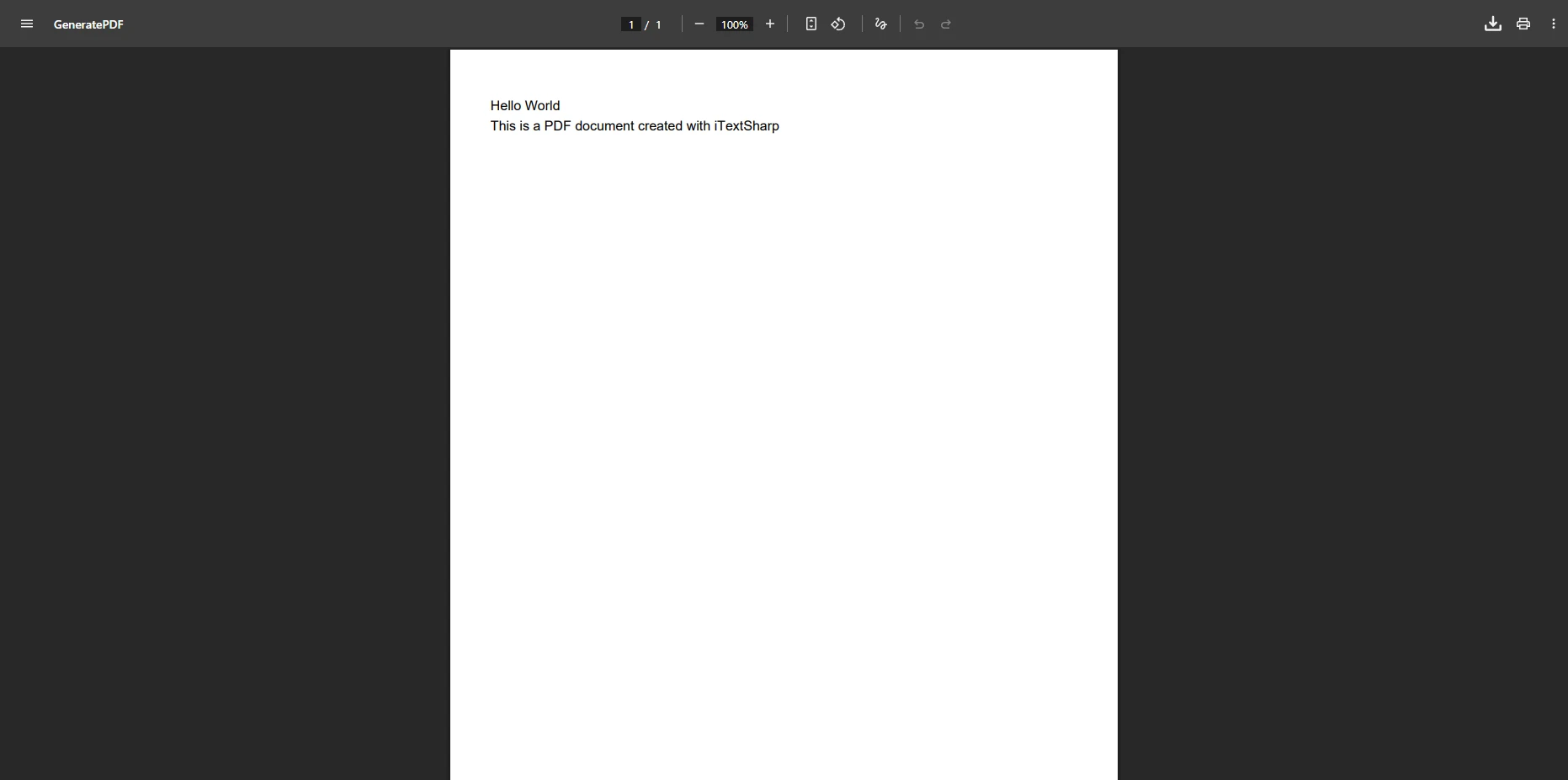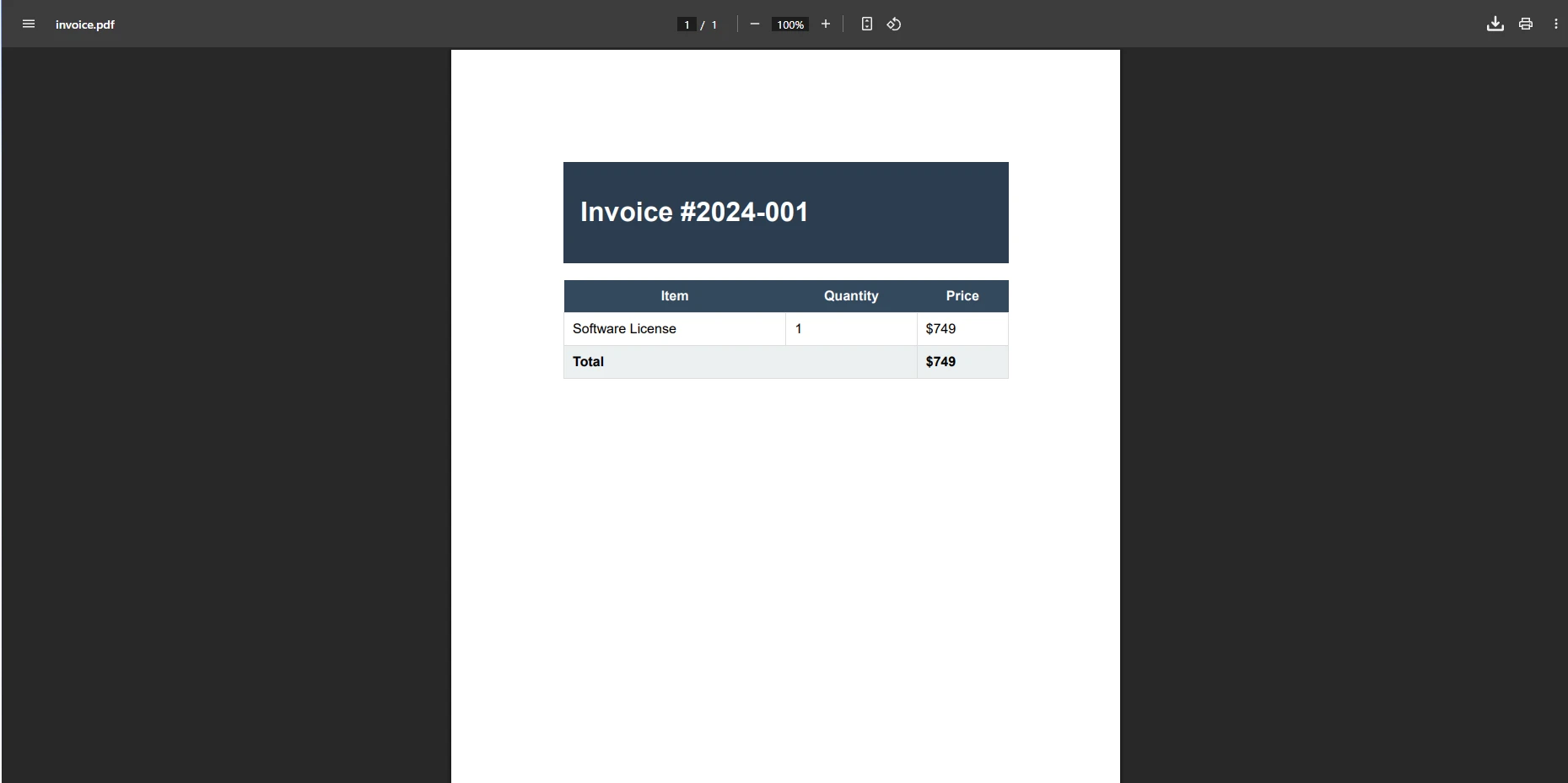A Comparison of Creating PDF in C# Between ITextSharp and IronPDF
A Comparative Guide to Creating PDFs in C# with iTextSharp and IronPDF
In this modern era of digital media, the Portable Document Format (PDF) stands out as one of the most universally used, standard document formats for transferring data without losing formatting. Its versatility, platform independence, and ability to preserve document formatting make it an ideal choice for sharing information.
Creating PDFs programmatically is a common necessity in both desktop and web applications. Programmatically creating PDFs allows developers to generate documents dynamically based on real-time data.
This is particularly valuable for applications that need to generate reports, invoices, or certificates on the fly. The PDF file format is created by Adobe, which offers the capability to create PDFs and you can explore its features at Adobe Create PDF.
In this article, we will explore the process of creating PDF documents programmatically in C# with two popular libraries iTextSharp and IronPDF.
Introduction to iTextSharp Library
iTextSharp, launched in December 2009, emerged as a revolutionary PDF tool, superseding its predecessor, iText 2. As the .NET version of iText 5, it paved the way for advanced programmable PDF functionalities. iTextSharp, the .NET version of iText 5, has long been a reliable source for creating a programmable PDF document object.
Summary of Creating PDFs with iTextSharp
- Create a new C# Project in Visual Studio.
- Install the iTextSharp library from NuGet Package Manager.
- Create an instance of PdfDocument class.
- Instantiate it with PdfWriter object.
- Create a Document object and pass the PdfDocument object to it.
- Add text to Document object using Paragraph class.
- Close the Document object.
Key Features of iText 5
Here are some important key features of iTextSharp DLL:
Dynamic PDF Generation
iTextSharp empowers developers to dynamically generate or manipulate PDF documents. This feature is invaluable for creating documents and reports based on data from XML files or databases.
Interactive Forms
The library facilitates the creation and filling out of interactive forms, enhancing user engagement and interactivity.
Advanced PDF Features
iTextSharp allows developers to exploit numerous interactive features, such as adding bookmarks, page numbers, watermarks, and more to existing PDF files. This flexibility is essential for tailoring PDFs to specific requirements.
Map and Book Creation
Developers can leverage iTextSharp to create maps and books, expanding the application of the library beyond basic document generation.
PDF Standards Compliance
iTextSharp supports various PDF standards, including PDF/A for archiving, PDF/UA for accessibility, ZUGFeRD for electronic invoicing, and PDF 2.0 (though not all functionalities are covered).
The Release of iText Core Version 8
While iTextSharp has been a robust choice for PDF manipulation, iText 5/iTextSharp has been superseded by iText Core version 8, which brings forth numerous improvements. Developers are encouraged to consider transitioning existing projects to iText 8 to benefit from the latest releases.
Key Features of iText Core version 8
Here are some key features of iText 7 version 8:
Enhanced Functionality
iText introduces enhancements in functionality, performance, and extensibility compared to its predecessor.
Improved APIs
The latest version provides improved APIs for more intuitive and efficient development.
Documentation and Support
iText comes with updated documentation and support, ensuring a smoother development experience.
Optimized Invoicing
With the iText 7 version 8 Suite, developers can optimize invoicing, ensuring long-term archiving and addressing compliance issues through its powerful PDF SDK.
Creating PDFs with iTextSharp in Depth
Step 1: Install iTextSharp Library
To create a PDF document with iTextSharp, follow these steps to install the library using the NuGet Package Manager:
- Open Visual Studio and create a new project.
Right-click on the project in the Solution Explorer and select "Manage NuGet Packages."
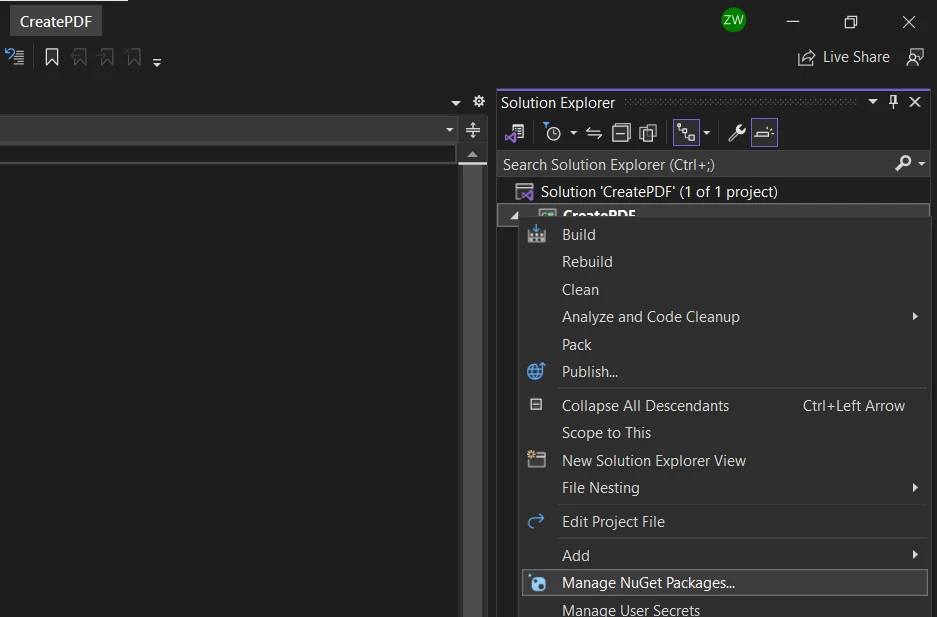
- In the "NuGet Package Manager" window, select the "Browse" tab.
Type "iTextSharp" in the search bar and press Enter.
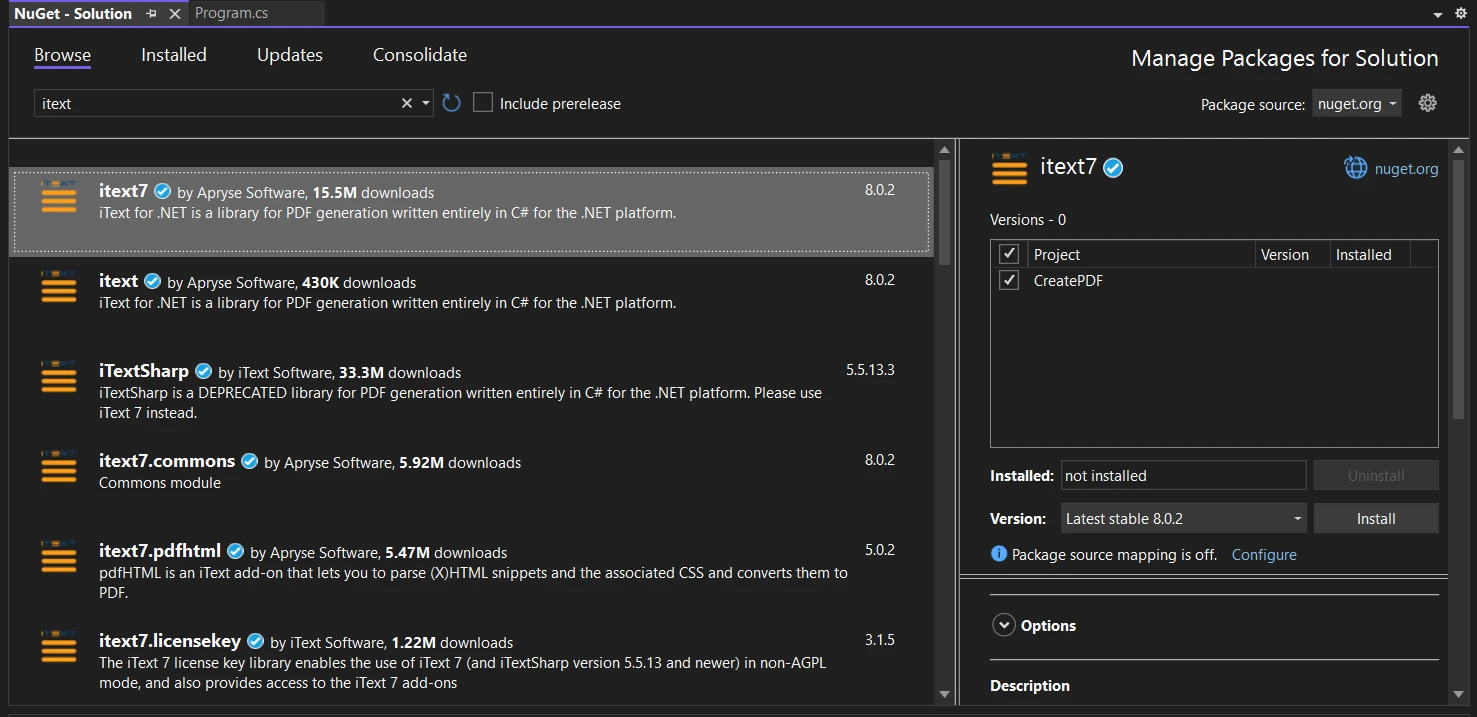
- Select "iText 7" from the search results and click "Install."
- Review and accept the dependencies, then click "OK" to proceed.
- Wait for the installation to complete, and iTextSharp can now be added to your project.
Step 2: Code to Create a PDF Document with iTextSharp
Now, let's explore a basic example of creating a PDF using iTextSharp:
using System;
using System.IO;
using iText.Kernel.Pdf;
using iText.Layout;
using iText.Layout.Element;
class Program
{
static void Main(string[] args)
{
// Create a new PDF document with a FileStream and PdfWriter
using (PdfDocument pdfDocument = new PdfDocument(new PdfWriter(new FileStream("/myfiles/hello.pdf", FileMode.Create, FileAccess.Write))))
{
// Create a document object
using (Document doc = new Document(pdfDocument))
{
// Add a paragraph to the document
string line = "Hello! Welcome to iTextSharp. Created with latest iText core version 8.";
doc.Add(new Paragraph(line));
}
}
// Print a message to the console
Console.WriteLine("PDF created successfully!");
}
}using System;
using System.IO;
using iText.Kernel.Pdf;
using iText.Layout;
using iText.Layout.Element;
class Program
{
static void Main(string[] args)
{
// Create a new PDF document with a FileStream and PdfWriter
using (PdfDocument pdfDocument = new PdfDocument(new PdfWriter(new FileStream("/myfiles/hello.pdf", FileMode.Create, FileAccess.Write))))
{
// Create a document object
using (Document doc = new Document(pdfDocument))
{
// Add a paragraph to the document
string line = "Hello! Welcome to iTextSharp. Created with latest iText core version 8.";
doc.Add(new Paragraph(line));
}
}
// Print a message to the console
Console.WriteLine("PDF created successfully!");
}
}In this source code, we created a new PDF document by passing a PdfWriter class object. The FileStream object specifies the PDF file name and file mode to create the PDF document. We then pass this PdfDocument object to the Document class for PDF creation.
Finally, we added a string text as a new paragraph with the text "Hello! Welcome to iTextSharp. Created with latest iText core version 8." and closed the document to save memory. The created PDF document is saved as "hello.pdf" in the specified location within the 'myfiles' folder.
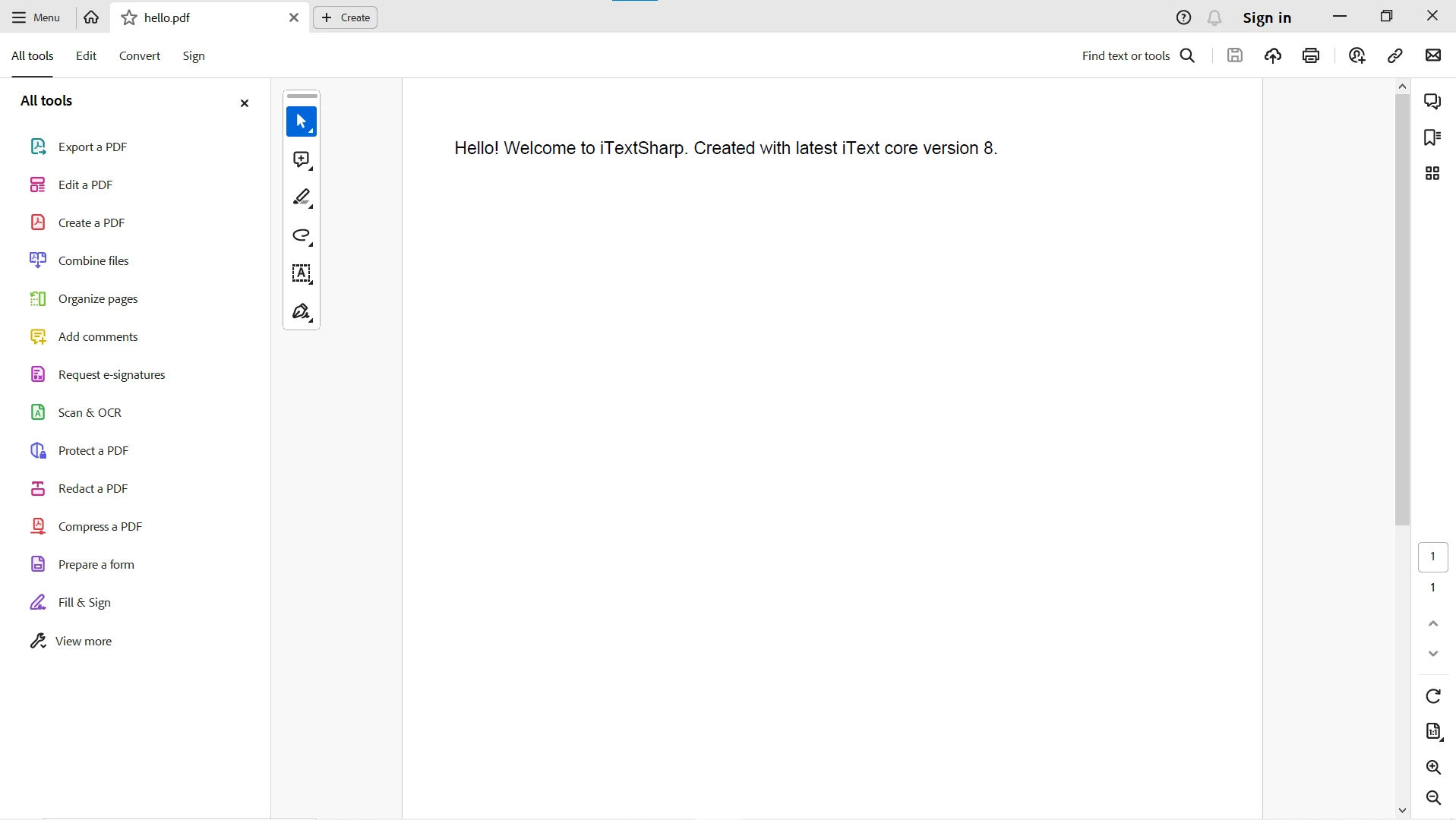
Introduction to IronPDF
IronPDF is a comprehensive C# library that empowers developers to interact with PDFs in a versatile and efficient manner. Whether you're creating PDFs from scratch, converting HTML and CSS to PDF, or adding advanced features like digital signatures and watermarks, IronPDF provides a rich set of tools for all your PDF-related needs.
Key Features of IronPDF
HTML to PDF Conversion
IronPDF excels in converting HTML and CSS to high-quality PDF documents. This feature is particularly valuable for developers dealing with web content or dynamic HTML-based reports.
PDF Creation and Manipulation
Developers can create PDFs from scratch, add content dynamically, and manipulate existing PDFs with ease. This flexibility allows for the generation of customized documents tailored to specific requirements.
Text, Images, and Forms
IronPDF supports the inclusion of text, images, tables, and forms in your PDF document. This makes it a versatile tool for creating diverse types of content within PDFs.
Digital Signatures
Security is paramount, and IronPDF enables the addition of digital signatures to PDF documents. This feature is crucial for applications dealing with sensitive information or legal documents.
Watermarks and Annotations
Enhance your PDFs with watermarks, annotations, and additional metadata. IronPDF provides the means to add visual elements and notes to your documents, improving communication and document clarity.
PDF/A and PDF/UA Compliance
IronPDF supports compliance with PDF/A standards for archiving and PDF/UA standards for accessibility. This ensures that your documents meet industry standards for long-term archiving and accessibility requirements.
Cross-Platform Support
IronPDF is designed to work seamlessly across different platforms, providing a consistent experience for developers working in various environments.
User-Friendly Interface
The library comes with a user-friendly API that simplifies complex PDF operations. This allows developers to focus on application logic rather than solving complex PDF functionalities.
Creating PDFs with IronPDF
Step 1: Install IronPDF Library
To get started with IronPDF, follow these steps to install the library using the NuGet Package Manager:
- Open Visual Studio and create a new project.
- Right-click on the project in the Solution Explorer and select "Manage NuGet Packages."
In the "NuGet Package Manager" window, select the "Browse" tab.
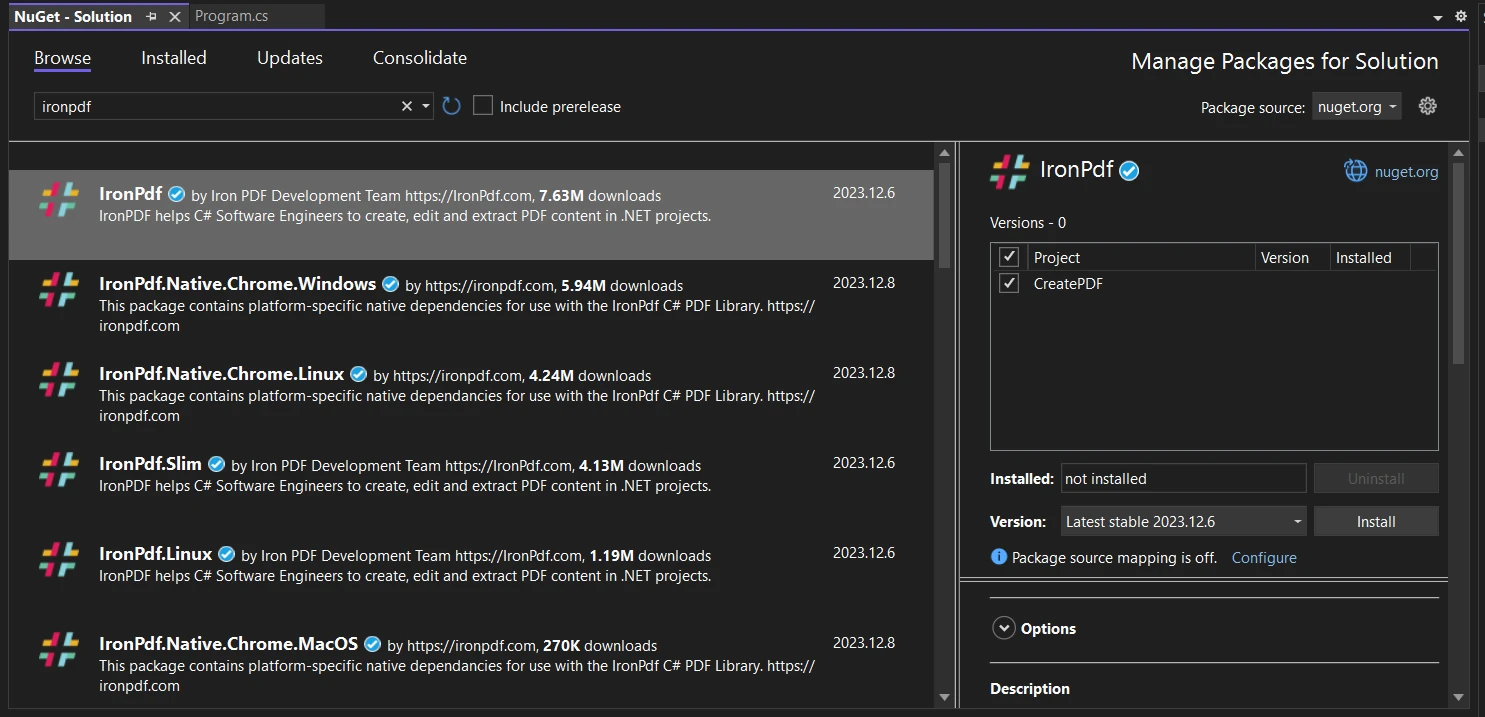
- Type "IronPDF" in the search bar and press Enter.
- Select "IronPDF" from the search results and click "Install."
- Review and accept the dependencies, then click "OK" to proceed.
- Wait for the installation to complete, and IronPDF can now be added to your project.
Step 2: Code to Create a PDF Document with IronPDF
Now, let's look at the following code for creating a PDF from an HTML string using IronPDF:
using IronPdf;
class Program
{
static void Main(string[] args)
{
// Instantiate renderer
var renderer = new ChromePdfRenderer();
// Create a PDF from an HTML string using C#
var pdf = renderer.RenderHtmlAsPdf("<h1>Hello World</h1>");
// Export to a file or Stream
pdf.SaveAs("output.pdf");
// Print a message to the console
Console.WriteLine("PDF created successfully using IronPDF!");
}
}using IronPdf;
class Program
{
static void Main(string[] args)
{
// Instantiate renderer
var renderer = new ChromePdfRenderer();
// Create a PDF from an HTML string using C#
var pdf = renderer.RenderHtmlAsPdf("<h1>Hello World</h1>");
// Export to a file or Stream
pdf.SaveAs("output.pdf");
// Print a message to the console
Console.WriteLine("PDF created successfully using IronPDF!");
}
}In the above source code, we created a new ChromePdfRenderer, rendered the HTML string content (in this case, a heading) as a PDF, and saved the generated PDF document as "output.pdf." IronPDF converts HTML to a pixel-perfect PDF document.
To generate PDFs with more control, such as by setting page size, adding image files, meta information, and other elements, please visit this documentation for more information.
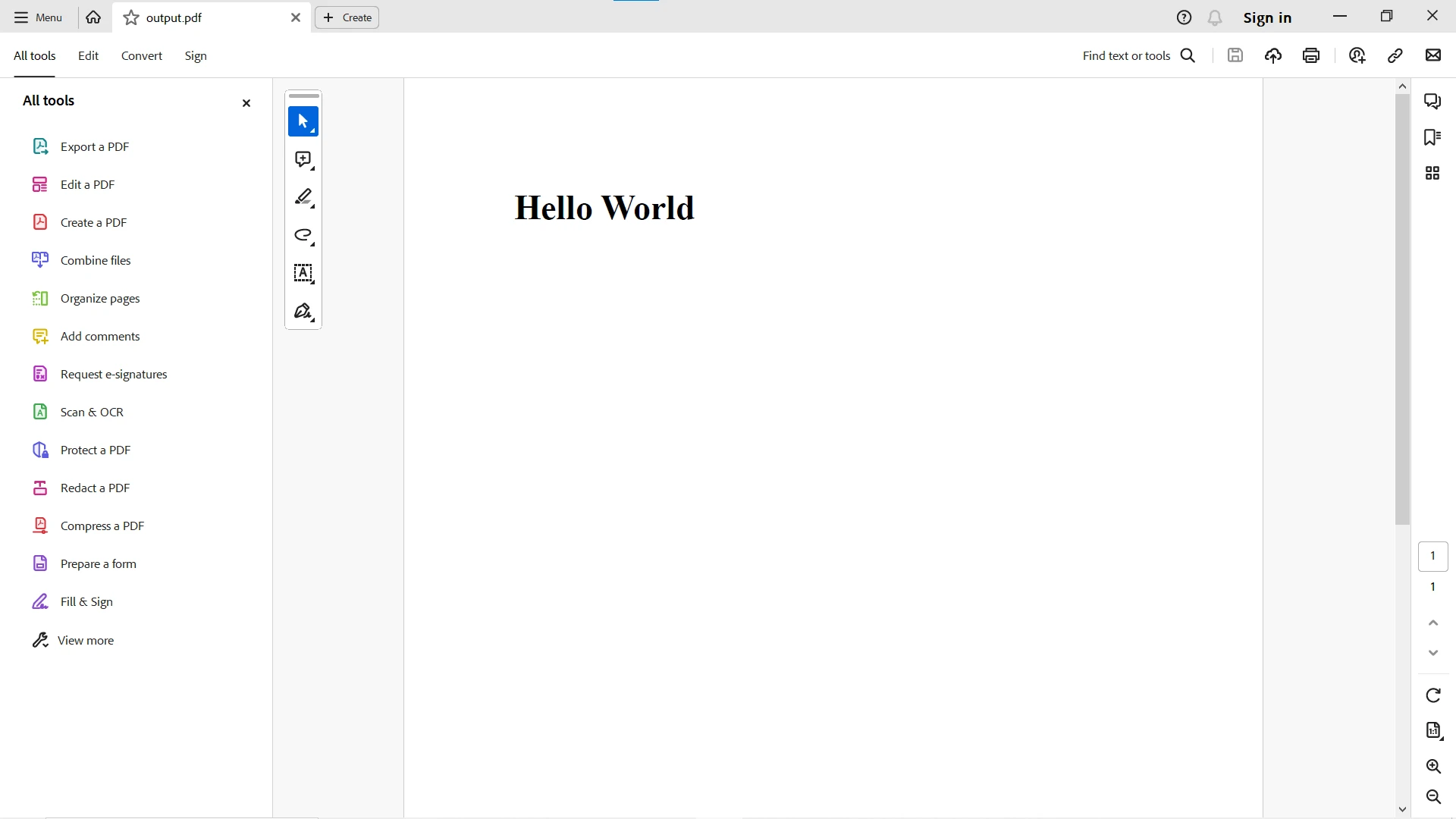
Conclusion
Both IronPDF and iTextSharp, now formally known as iText, are formidable libraries for creating PDFs in C#, each with its strengths.
IronPDF stands out for its user-friendly interface and extensive documentation, making it an excellent choice for developers seeking simplicity. iTextSharp, on the other hand, is renowned for its robust feature set, especially in environments where advanced PDF manipulation is crucial.
Both iText and IronPDF are robust solutions for PDF generation and manipulation, but IronPDF tends to outperform iText in terms of speed and efficiency. This advantage is attributed to IronPDF's optimized architecture, leveraging native code for critical tasks and ensuring high performance.
Notably, IronPDF excels in HTML rendering, making the generation of PDFs from HTML faster compared to traditional methods employed by iText. Additionally, IronPDF tends to be more memory-efficient, particularly advantageous in environments with limited resources. Overall, IronPDF's streamlined architecture and proficiency in HTML rendering contribute to its slight edge in performance over iText.
For a full comparison between IronPDF and iTextSharp, please visit this detailed comparison between IronPDF and iTextSharp.
IronPDF provides a free trial license for more information. Download the library from the IronPDF download page.
Frequently Asked Questions
How can I convert HTML to PDF in C#?
You can use IronPDF's RenderHtmlAsPdf method to convert HTML strings into PDFs. You can also convert HTML files into PDFs using RenderHtmlFileAsPdf.
What are the key differences between iTextSharp and IronPDF?
iTextSharp is known for its robust feature set, including dynamic PDF generation and interactive forms, while IronPDF excels in HTML to PDF conversion, user-friendly interface, and higher efficiency in handling HTML content.
How do you create a PDF document programmatically in C#?
To create a PDF document programmatically in C#, you can use IronPDF to easily render HTML and CSS into PDF documents or use iTextSharp for a more traditional approach with PdfDocument and Document objects.
What improvements are offered in iText Core version 8?
iText Core version 8 offers enhanced functionality, improved APIs, better documentation, and optimized capabilities for tasks like invoicing compared to its predecessor, iTextSharp.
How do you install IronPDF in a C# project?
IronPDF can be installed in a C# project via the NuGet Package Manager in Visual Studio by searching for 'IronPDF' and following the prompts to complete the installation.
What features does IronPDF offer for PDF generation?
IronPDF provides features such as HTML to PDF conversion, the ability to add text, images, forms, watermarks, and digital signatures to PDFs, along with cross-platform support and a user-friendly interface.
Is there a trial version available for IronPDF?
Yes, IronPDF offers a free trial license available on their website, allowing developers to explore and test its features and capabilities.
What compliance standards does IronPDF adhere to?
IronPDF supports compliance with PDF/A standards for archiving and PDF/UA standards for accessibility, ensuring documents meet industry standards.
Why is IronPDF preferred for HTML rendering?
IronPDF is preferred for HTML rendering because it uses a ChromePdfRenderer to convert HTML and CSS directly into high-quality PDF documents, offering pixel-perfect rendition of web content.
What are the common troubleshooting scenarios with PDF libraries in C#?
Common troubleshooting scenarios include installation issues, rendering errors with HTML content, and compatibility with different versions of .NET. IronPDF provides extensive documentation and support to address these challenges.


